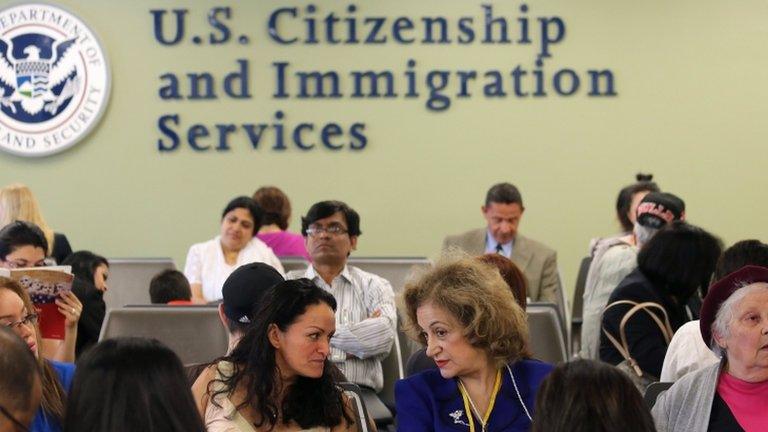America's immigration conundrum
- Published
- comments
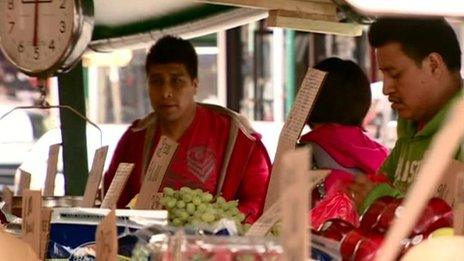
Stallholders at the Ninth Street market
Juan Carlos Romero, a fresh-faced man from Mexico, sets out flowers in aluminium buckets in front of his shop in south Philadelphia's Ninth Street market.
They are a bright splash of colour on what starts as a rather grey day.
Latino music blasts from a clothes shop on the other side of the road. Pineapples and chillies, fresh fish and spicy sausages are on display.
The street is a buzzy, gritty sort of place. Originally home to the Italian Market, external, it is as much a product of South and Central America as of old Europe.
Everyone seems to know everyone else, it is an antidote to all those depressingly anonymous malls littering every US state.
The cliche that springs to mind is "tight-knit", but the weave is made up of citizens and illegal immigrants and there are tensions in the fabric between old and new.
The flower man, Mr Romero, has a wife and little daughter. He works hard - sometimes 14 hours a day, he tells me - running both the florist and a restaurant he owns. He has been in the US for 10 years now, an illegal immigrant, without papers.
"I feel insecure, impotent. I feel like I am extraneous. It is a very bad sensation," Mr Romero says.
He is looking to Washington to change that - and now immigration reform has a real chance because of the support of some Republicans, external.
"I hear the Republican from Florida [Marco Rubio, external] and he says things that are good news, but the others sound very hard," he says.
The US city of Baltimore is actively inviting immigrants to settle there without questioning how they came into the country, BBC Mundo's William Marquez reports.
"Some of them don't trust us - it's very sad. They have a big country, I hope the Republicans and Democrats make a good reform to help us.
"They say there are 11 million undocumented workers. I don't know, maybe it is more. But we need reform to help us live in this very nice country."
Immigration reform is the hottest issue, external on Capitol Hill right now.
Central is the idea of amnesty - allowing the millions of illegal immigrants to eventually become American citizens.
Many Republicans instinctively recoil, external from the idea, seeing it as a reward for people who have broken the law.
But it is a huge test for the party after their defeat in the last election.
It was an election where President Barack Obama took 71% of the Latino vote, external. Some think it tipped the balance here in Pennsylvania, external and other key states.
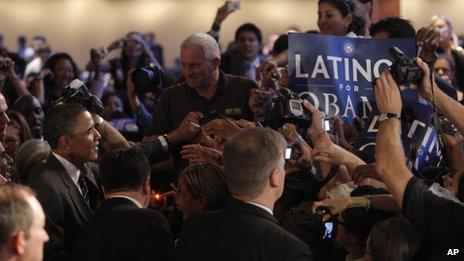
Courting the Latino vote in 2008 too
At first sight, it may seem a puzzle how the treatment of people who are not US citizens, who cannot vote, might influence the outcome of elections.
Jorge Salazar, of the Pennsylvania Immigration and Citizenship Coalition, external, explains it well.
He was brought to this country from Bolivia by his parents when he was seven. They came on a visa, but stayed on when it ran out.
He is now 30 and still has no papers. He talks about the constant threat of deportation as if it was a war.
"Family members can disappear overnight," he says. "I lost my aunt - she was deported 2001. Her kids are citizens, and they've never been the same."
Looking beyond outdated stereotypes to capture the everyday lives of Latinos in America
He say all parties have to get serious about changes.
"Republicans have a hard time with the Latino community because of their immigration attitude," Mr Salazar says.
"They are becoming aware the Latino community is very strong. Everybody who is here undocumented has someone who can vote.
"I am undocumented but my sister is documented so she can cast a vote for me. All my cousins, all my uncles - everybody apart from my small nuclear family - have the right to vote.
"They will exercise that right to help me out - a lot of Latinos know what's at stake. We have shown that in the last election and that is why Republicans have started to have dialogue about this."
He is going to the Pennsylvania state capital to talk about this with one Republican who is eager to help and wants to change his party's image with Latinos.
'Living the dream'
The elegant state capital, Harrisburg, is very different to the bustle of Philadelphia.
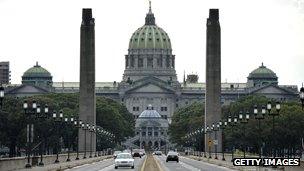
The State Capitol in Harrisburg
State Street is dominated by two buildings. One is St Patrick's Cathedral, external, built with German marble and the money of Irish immigrants. The other is the Capitol itself, external.
Inside, under the magnificent classical dome, State Senator Lloyd Smucker is meeting Mr Salazar and other children of illegal immigrants to discuss his new bill, external.
The proposal would make it cheaper and easier for people like them to go to university in Pennsylvania.
Sen Smucker is insistent this is about principle not politics: "These students came here through no choice of their own. This is their home.
"They are here to stay. They have a wonderful ability to contribute - we ought to give them the opportunity to do so," he says.
I believe Sen Smucker that for him this is not about harvesting votes, but he readily agrees that his party needs to change its image with Latinos.
"I do think so," Sen Smucker says. "We've had our own share of proposals from the Republican side here that I didn't agree with in the past.
"I think we do need to think about these things differently. The mood is shifting and I am glad to see it."
The immigration bill up in Washington DC is not his fight, but it is clear which side he is on.
"I think the immigration system is broken so I am glad to see debate about that," Sen Smucker adds.
"We should embrace diversity. My own personal view is that many people do still see America as a land of opportunity and we should welcome people who want to come here and live the American dream."
The whole idea behind the senator's bill is to make it easier and more comfortable for some illegal immigrants to stay in the US.
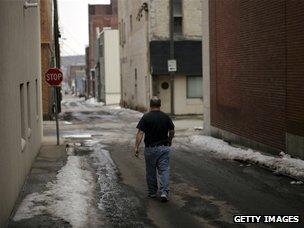
A coal mining town, Hazleton's fortunes have fallen
I travelled on to Hazleton, one of those broken, old industrial towns of Pennsylvania. The message here is: "go home".
It seems a beaten-down place, struggling to keep its head above water after waves of economic bad news. But some seem to like the place.
In front of shops offering tax advice in Spanish, there is a bright yellow van, a Hazelton address on its side, promising door-to-door delivery from the Dominican Republic.
The Latino population has increased rapidly, external in recent years.
Way before the state of Arizona came up with stringent laws, external to encourage "self-deportation", the mayor here pushed for tough new laws punishing anyone who gave an illegal immigrant a job.
The law is now being fought over in the courts. But Lou Barletta is convinced he was right. Hazleton's former mayor is now a congressman in Washington DC and he will fight the new immigration bill all the way.
He says: "I don't think we should be talking about any pathway to citizenship or amnesty.
"At home you wouldn't talk about replacing your carpet if you still had a hole in your roof. On a ship that was taking on water, you would plug the holes first.
"We should be talking about one thing first and one thing only: securing our borders. Until we do that we are only going to make our problem worse."
The congressman says the only reasons Republicans are talking about this are political - and voters hate that. He adds that amnesty has always failed.
"We are only going to make the problem worse like we did in 1986 under Ronald Regan when 1.5 million people were going to be given amnesty," Mr Barletta adds.
"The internet is the safest place to look for things when you are undocumented"
"As soon as that declaration was made, that number quickly grew to three million people and here we are talking about it again and our borders still aren't secure.
"The 11 million that are here illegally now could double or even triple if we continue promising people they could have American citizenship."
Mr Barletta tells me at length about the problems illegal immigration caused his town - he talks about shootings and murders and drug deals.
He talks about illegal immigrants crowding into the local hospital for everything from "hang nails to heart attacks, putting strain on the fire service and the schools".
But he maintains he is pro-immigration. He says the presence of illegal workers hurts those who have come here legally more than anyone else, forcing down wages and damaging the quality of life.
Mr Barletta says his party has got it wrong.
"In a city that is 47% Latino, you would think I would be a poster child for the Latino community to go after," he adds. "I won my third term for mayor with over 90% of the vote.
"Why would the people who know me the best, those that were the closest, while I was proposing these ordinances - why would the Latino population grow every single year since the ordinance?
"I am probably the strongest voice for the Latinos in America because I want them to earn more money, so they can give their children a better life."
This debate is about the direction of a party.
Many immigrants in Alabama are facing the same problems as Maria, including Daniel who says the new law makes it difficult for his brother to receive the medical treatment he needs
But it is also about the continuing conundrum of America's attitude to immigration. On Ninth Street, not all the descendants of Italian immigrants welcomed people from different lands, be they legal or illegal.
There is a question about who should share in the American dream, and when the drawbridge should be pulled up.
I asked one of those meeting with the state senator why she felt she should be allowed to stay when she came here illegally.
At first 17-year-old Ahslie Rosas, who came from Mexico with her family five years ago, disputed the premise - they had come here legally but stayed when her father's visa ran out. But her final answer was eloquent.
"We might be breaking the law but we are seeking a better future," she says.
"America is an immigration country. Americans came from Europe to this land. That's us, too. "
- Published7 June 2013
